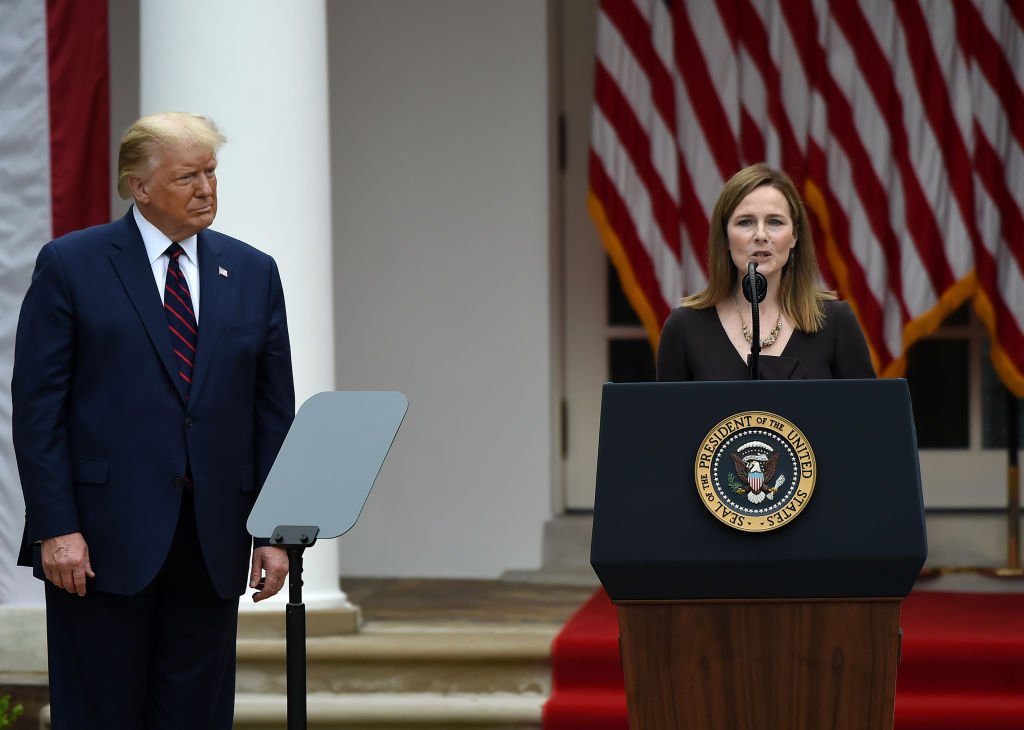Far fewer Americans back SCOTUS hearings for Barrett today than supported Garland's hearings in 2016


A free daily email with the biggest news stories of the day – and the best features from TheWeek.com
You are now subscribed
Your newsletter sign-up was successful
Republicans see this year's Supreme Court fight differently than they did in 2016. Americans do too.
When former President Barack Obama moved to fill an election-year Supreme Court vacancy in 2016, a Monmouth University poll found 73 percent of voters said the nominee, Merrick Garland, should get a hearing. But this time around, Monmouth found just 53 percent say President Trump's nominee Amy Coney Barrett should be considered.
Trump formally nominated the conservative 7th Circuit judge on Saturday to replace liberal Justice Ruth Bader Ginsburg. Democratic senators have universally said they don't believe Barrett should get a hearing, and most have said they will vote against her nomination because of it. Democratic voters largely agree with their strategy, with just 31 percent saying the Senate should hold hearings to consider Trump's nominee and 67 percent saying they should not, the Monmouth poll found. Meanwhile 73 percent of Republicans say the Senate should hold the hearings, and 60 percent of independents agree.
The Week
Escape your echo chamber. Get the facts behind the news, plus analysis from multiple perspectives.

Sign up for The Week's Free Newsletters
From our morning news briefing to a weekly Good News Newsletter, get the best of The Week delivered directly to your inbox.
From our morning news briefing to a weekly Good News Newsletter, get the best of The Week delivered directly to your inbox.
Back in 2016, the party split on SCOTUS nominations looked pretty different. More than half — 56 percent — of Republicans said Garland should get a hearing that year. Still, Garland's nomination came in March, more than seven months before Election Day, while Barrett's came five weeks before. Garland was also considered a moderate candidate, while Barrett's record has been compared to the conservative Antonin Scalia's.
Monmouth surveyed 809 registered voters via landline and cell phone from Sept. 24–27, with a margin of error of 3.5 percentage points.
A free daily email with the biggest news stories of the day – and the best features from TheWeek.com
Kathryn is a graduate of Syracuse University, with degrees in magazine journalism and information technology, along with hours to earn another degree after working at SU's independent paper The Daily Orange. She's currently recovering from a horse addiction while living in New York City, and likes to share her extremely dry sense of humor on Twitter.
-
 Why are election experts taking Trump’s midterm threats seriously?
Why are election experts taking Trump’s midterm threats seriously?IN THE SPOTLIGHT As the president muses about polling place deployments and a centralized electoral system aimed at one-party control, lawmakers are taking this administration at its word
-
 ‘Restaurateurs have become millionaires’
‘Restaurateurs have become millionaires’Instant Opinion Opinion, comment and editorials of the day
-
 Earth is rapidly approaching a ‘hothouse’ trajectory of warming
Earth is rapidly approaching a ‘hothouse’ trajectory of warmingThe explainer It may become impossible to fix
-
 Nobody seems surprised Wagner's Prigozhin died under suspicious circumstances
Nobody seems surprised Wagner's Prigozhin died under suspicious circumstancesSpeed Read
-
 Western mountain climbers allegedly left Pakistani porter to die on K2
Western mountain climbers allegedly left Pakistani porter to die on K2Speed Read
-
 'Circular saw blades' divide controversial Rio Grande buoys installed by Texas governor
'Circular saw blades' divide controversial Rio Grande buoys installed by Texas governorSpeed Read
-
 Los Angeles city workers stage 1-day walkout over labor conditions
Los Angeles city workers stage 1-day walkout over labor conditionsSpeed Read
-
 Mega Millions jackpot climbs to an estimated $1.55 billion
Mega Millions jackpot climbs to an estimated $1.55 billionSpeed Read
-
 Bangladesh dealing with worst dengue fever outbreak on record
Bangladesh dealing with worst dengue fever outbreak on recordSpeed Read
-
 Glacial outburst flooding in Juneau destroys homes
Glacial outburst flooding in Juneau destroys homesSpeed Read
-
 Scotland seeking 'monster hunters' to search for fabled Loch Ness creature
Scotland seeking 'monster hunters' to search for fabled Loch Ness creatureSpeed Read
